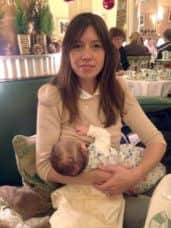Farage sparks fury by saying breastfeeding mothers ‘should sit in the corner’


The UKIP leader’s suggestion that businesses could ask mothers to “sit in a corner” to avoid offending other people were met with a storm of criticism.
Mr Farage, a father-of-four, prompted outcry following a radio phone-in during which he was asked his views on of a recent incident at Claridge’s hotel in London where a mother was asked to cover up with a napkin while feeding her baby. Louise Burns has said she will not return to the luxury hotel in Mayfair, after being asked to cover her daughter with what she described as a “shroud” while feeding her.
Advertisement
Hide AdAdvertisement
Hide AdHe replied that while he had “no problem” with breastfeeding, it should be up to businesses whether to put rules in place to encourage women to be discreet.


Setting out his views on the subject, Mr Farage said: “I am not particularly bothered about it, but I know a lot of people do feel very uncomfortable.
“This is just a matter of common sense, isn’t it? Given that some people feel very embarrassed by it, it isn’t too difficult to breastfeed a baby in a way that is not openly ostentatious.”
Mumsnet chief executive Justine Roberts led widespread condemnation of Mr Farage.
Advertisement
Hide AdAdvertisement
Hide AdShe said: “It’s bemusing that some people have a problem seeing mums breastfeeding.
“It is of course a natural, essential human process and those with an issue simply need to get over themselves - babies need to be fed when they’re hungry, and there’s nothing ostentatious about a mother responding to that need.”
Shadow home secretary Yvette Cooper tweeted “after that interview Nigel Farage should sit in a corner”, while Downing Street stressed David Cameron’s disapproval.
A Number 10 spokeswoman said: “The Prime Minister shares the view of the NHS, which is that breast-feeding is completely natural and it’s totally unacceptable for any women to be made to feel uncomfortable when breast-feeding in public.”
Advertisement
Hide AdAdvertisement
Hide AdThe row comes just four months after Leeds Trinity University published new research which found that despite the widely-known benefits of breastfeeding, “embarrassment when breastfeeding in public” was one of the major challenges mothers faced.
Leeds mother-of-two Elinor Hipkin, aged 33, pointed to the 2010 Equality Act, which makes it unlawful for a business to discriminate against a breastfeeding woman, when criticising Mr Farage’s comments.
She said: “Breastfeeding women are protected by law. You can’t treat a woman less favourably because she is breastfeeding, and she is allowed to breastfeed her baby anywhere that baby is allowed to be.
“Farage seems to have forgotten this.
“For many women, covering up isn’t an option. Lots of women need both hands free and a good view in order to latch a baby on successfully.”
Advertisement
Hide AdAdvertisement
Hide AdIn a later statement Mr Farage sought to clarify his position on the issue.
He said: “What I said was that if the establishment in question, wants to maintain rules about this stuff, then that is up to them, as it should be. I remarked that perhaps they might ask women to sit in a corner.
“Did I say I believe they should have to? No.”
• Encouraging mothers to breastfeed for longer could improve their health and also save the NHS more than £40million a year, according to new research.
A report by a team of researchers at Brunel University said savings would come from reducing common childhood illnesses and cutting the risk of women developing breast cancer, linked to low rates of breastfeeding. It also said £11m could be saved by cutting the occurrence of infections in babies if women who exclusively breastfed for one week were to keep going for four months.